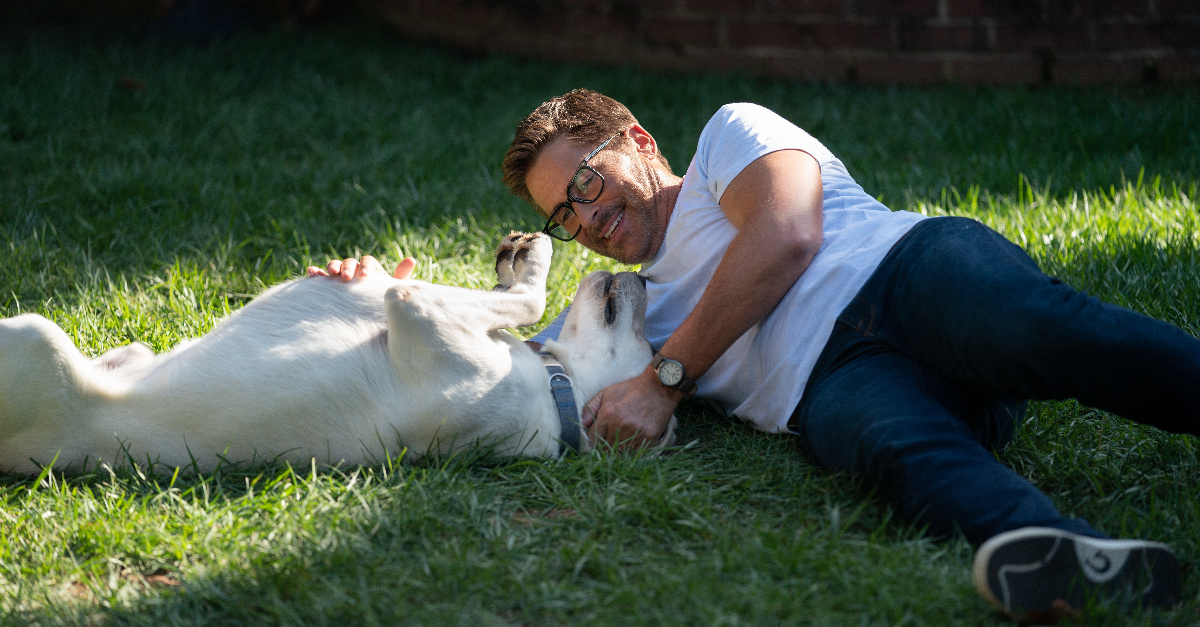Fielding is a recent college graduate who is searching for direction in life.
His best friend has a job. His other friends do, too. Fielding, though, doesn’t yet know what career he wants to pursue. To make matters worse, his girlfriend just dumped him.
Sad and lonely, Fielding gets a dog, naming it “Gonker.”
They instantly bond. He sleeps with Gonker. He exercises with Gonker. As he later says, Gonker is the best friend he has ever had.
But then Gonker goes missing on the Appalachian Trail, running away as the two hike near the home of Fielding’s parents.
“I promise you we will find that dog,” Fielding’s dad says, knowing its importance in his son’s life.
The father-son team set out on a quest down the Appalachian Trail to search for Gonker. Will they find success?
It’s part of the new Netflix family-centric film Dog Gone (TV-PG), which stars Rob Lowe as Fielding’s father, Kimberly Williams-Paisley as his mother and Johnny Berchtold as Fielding.
Here are three things you should know:
Photo courtesy: Cr. Bob Mahoney/Netflix © 2022, used with permission.

1. It’s Based on a True Story
The film is based on a book of the same name by author Pauls Toutonghi, who recounted the real-life story of a young man named Fielding Marshall who, in 1991, was battling an “oceanic wave of sadness” – his young daughter had died, and his girlfriend had left him – by getting a dog he named “Gonker.” Each morning, the dog helped brighten his day.
Although the film changes a few less-important parts of the plot, the core of the story is true. Gonker suffered from Addison’s disease, an adrenal imbalance that requires monthly injections. (In the film, Fielding is racing against the clock to find his dog.) Like the film, Gonker went missing on the Appalachian Trail during a hike with Fielding. Another major part of the story also is true: Fielding hiked the trail with his father in search of Gonker, with his mother running a “command center” back home. By the time they found him, Gonker had walked 111 miles in 15 days, according to The New York Post.
Photo courtesy: Cr. Bob Mahoney/Netflix © 2022, used with permission.

2. It Spotlights Family, Love and Reconciliation
The film follows two tracks: Fielding’s search for Gonker and Fielding’s search for direction in life. At the beginning of the movie, Fielding graduates from college with little idea of what career to pursue and with little interest in rushing out into the world. (He even oversleeps and misses his graduation.) His place in life contrasts with that of his friends and his father, a career-driven man.
“He hasn’t found his path yet,” his mother says.
Fielding’s father is frustrated with and embarrassed by his son but nevertheless agrees to walk the Appalachian Trail, fully believing the two will be successful in their venture. Fielding, for his part, wants his dad to love him the same way Gonker does.
It is only by watching Fielding interact with strangers on the trail – he is always kind – and by watching Fielding’s devotion to Gonker that the dad learns better to appreciate his son. (“I have always been proud of you,” he tells him. “... I take pride in your character”).
Photo courtesy: Cr. Bob Mahoney/Netflix © 2022, used with permission.

3. It Reminds Us of the Wonders of Pets
Dogs, and pets in general, are one of God’s great blessings. When we lovingly care for our canines – or, if you prefer, our cats – we are following God’s will in caring for and tending to His creation. (Psalm 147:9 reminds us that God “provides food for the cattle and for the young ravens when they call.”)
Dog Gone isn’t a faith-based film, but it nevertheless reflects biblical principles. Fielding takes action when he learns that an animal shelter may be abusing its pets. He displays impressive devotion when Gonker goes missing, not wanting his domesticated companion to become a victim to wolves. The film also reminds us that much “good” can come from the trials of life. (By searching for Gonker, a community comes together, and a family grows closer.)
It includes multiple lessons for parents: 1) Practice grace and patience as your teenagers enter into adulthood, 2) focus on their positive traits, not their negative ones and 3) don’t let the “rat race” of life distract you from enjoying your family.
The film includes minimal language (details below), no sexuality and only a few frightening scenes (we see a character spitting up blood from an abdominal condition). The film does make jokes about beer (we see college students drinking at a party), but it also includes a couple of faith-centric scenes. (A homeless man tells them to turn to Jesus, and the father responds, “We’re a member of the church. We probably don’t go as often as we should.”)
Dog Gone isn’t a perfect film, but with beautiful scenery, an impressive cast and a great message, it may be a solid pick for some families.
Rated TV-PG. Language details: OMG (6), h-ll (2), a-- (2), d—n (1), misuse of “God” (2). Other content warnings: Fielding and his friends hide beer bottles when his parents arrive at his house.
He and another friend have a brief discussion about atheism and philosophy, although neither takes a position. (“Is atheism a religion?”) Fielding faces a life-threatening illness.
Entertainment rating: 4 out of 5 stars
Family-friendly rating: 3.5 out of 5 stars
Photo courtesy: Cr. Bob Mahoney/Netflix © 2022, used with permission.
Michael Foust has covered the intersection of faith and news for 20 years. His stories have appeared in Baptist Press, Christianity Today, The Christian Post, the Leaf-Chronicle, the Toronto Star and the Knoxville News-Sentinel.
Listen to Michael's Podcast! He is the host of Crosswalk Talk, a podcast where he talks with Christian movie stars, musicians, directors, and more. Hear how famous Christian figures keep their faith a priority in Hollywood and discover the best Christian movies, books, television, and other entertainment. You can find Crosswalk Talk on LifeAudio.com, or subscribe on Apple or Spotify so you never miss an interview that will be sure to encourage your faith.